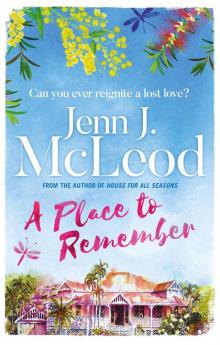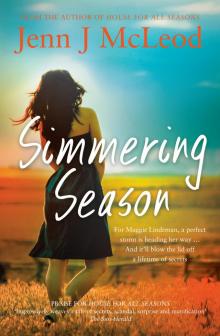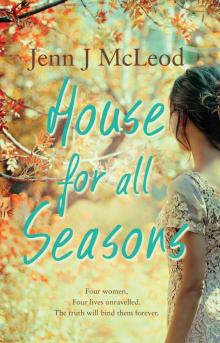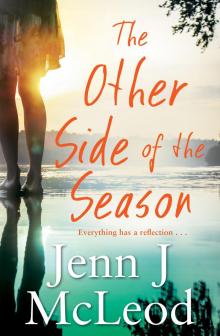- Home
- Jenn J. McLeod
Simmering Season
Simmering Season Read online
Praise for Simmering Season
‘A tangled web of family loyalties, guilt, secrets and would-be careers … A great read.’ Newcastle Herald
‘Simmering Season showcases McLeod’s ability to portray life in all its facets. In its laid-back Aussie way, this novel reaches out and grips your heart.’ Rowena Holloway Reviews
‘With Simmering Season, McLeod has cemented herself as an Australian contemporary fiction writer to watch. Like its predecessor, House for all Seasons, this book is full of heart.’ Write Note Reviews
Praise for House for all Seasons
‘Jenn J McLeod’s debut novel is an enthralling read that will leave you feeling compelled to ponder your own childhood memories … A captivating story.’ The Australian Women’s Weekly
‘A painful exploration of estrangement, loss, truth, redemption and the power of wishes.’ The West Australian
‘This debut novel from Australian Jenn J McLeod impressively weaves a tale of secrets, scandal, surprise and reunification.’ The Sun-Herald
‘A warm, engaging read, and such a great cast of characters.’ Diane Blacklock, author of The Best Man
To Dad—my moral compass—for letting me travel my own path through life, for loving me no matter how I strayed, and for letting me make my own choices even when you didn’t understand them.
perfect storm
— n
1. a combination of several events which are not individually dangerous until they converge, but occurring together can bring about a devastating outcome.
2. Maggie Lindeman’s summer.
1
Maggie
‘I always thought the next funeral I’d attend would be mine.’
Maggie didn’t know how to respond to Sara’s words, instead pressing a tissue into her teary friend’s palm. Sara dabbed it against one cheek then the other, her face wet and blotchy from crying, making the diminutive thirty-eight-year-old with the pixie blonde hairstyle and button nose even more child-like.
Unlike Sara, Maggie was tall enough to see to the front of the church, beyond the fashionable forest of millinery excellence. She wished she’d worn something stylish to cover her very un-coiffured hairdo, not that she looked particularly good in hats. Some of the local girls came to the Calingarry Crossing pub wearing their sweat-lined Akubras like a badge of honour. Not Maggie. Besides, the daily combination of hair combs, barrettes and crocodile clips she used to keep her hair under control and out of the patrons’ beers didn’t sit too well under a hat. To secure the rough French-twist today, she’d used her favourite dragonfly clamp, encrusted with tiny, polished turquoise stones, a gift from her husband seventeen years ago on the birth of their son, Noah.
After the last of four heartfelt eulogies, spoken amid sobs and sniffs, a procession of mourners filed past the white coffin bearing the biggest floral tribute Maggie had ever seen—a cloud of frangipanis. So many people. Some added small bouquets. Others left long-stemmed roses.
As the daughter of Calingarry Crossing’s Presbyterian minister, Maggie was no stranger to funerals—not to mention weddings, christenings and communions. Too soon after her mother’s death when Maggie was just thirteen, she’d inherited organ-playing duties, learning Here Comes The Bride, The Wedding March, and numerous pop tunes of the day that each bride and groom gushed was their own special song. The monotonous repertoire of ‘I Honestly Love You’ and ‘Unchained Melody’ drove Maggie crazy and added to the unbearable task of replacing her mother. When her father finally agreed to let Maggie hand the job over to one of the congregation, lilac-haired Lorna Pritchard stepped up to the plate, playing with gusto for years until the organ died, replaced by tinny recordings blaring from crackling speakers.
No signature songs or other crassness accompanied today’s funeral service. No, no, no. Amber Bailey-Blair would never have allowed crass at her farewell. As the mourners left the chapel, a string quartet played Amazing Grace.
After the magnificence of St Mark’s church—a fitting place to say goodbye to a much-loved socialite and charity patron—the exclusiveness of the gathering that followed should not have surprised Maggie.
‘This sure is nothing like any wake I’ve ever seen,’ Maggie whispered, afraid her voice might echo in the expansive, open-plan penthouse. Even sun-speckled Sydney Harbour, sprawled out beyond the floor-to-ceiling windows, seemed dull compared to the lavish decor and the sea of bejewelled but suitably subdued mourners now eddying in small groups and muttering respectfully, ‘What a lovely service’ and ‘Such a terrible shame’.
Although barely noon, champagne flowed. Waiters looking like penguins in their formal black and whites glided discreetly through the milling crowd with a passing parade of canapés. Neither Maggie nor Sara refused their offerings, and for the same unspoken reason; their old friend, Amber Bailey, would have insisted.
‘Maggie,’ Sara said in a small voice, ‘I know you and Amber weren’t so close at school, but there was no way I could prise Will away from the café and back to Sydney for her funeral. So thanks for coming with me.’
‘I didn’t mind. I wanted to come, but with Dad’s car playing up at the moment …’
‘You really should dump that thing. Will is always talking up the safety features of the Subaru.’
Maggie couldn’t even afford to get the strange knocking sound in her engine looked at; she’d never afford a car like Sara’s.
She thought the country café owner looked ill at ease in the simple navy dress and strappy silver sandals that had only ever seen one other occasion—the woman’s engagement celebration some twelve months earlier. Maggie’s memory of Sara at school was of a plain, quietly spoken student. How the girl had been friends with the outspoken trio of Amber, Poppy and Caitlin, Maggie never understood. It was possible she made them look better. Poppy Hamilton had certainly looked taller and tougher alongside super-petite Sara, and Amber was ten times prettier than them all. Sara did manage to keep up with clever Caitlin Wynter, despite erratic school attendance; although no one took much notice of the quiet kid in the corner who never got into trouble. Maybe they’d felt sorry for Sara back then. Maggie did. Most people in town did. There was ample reason.
‘I can’t blame Will for not coming,’ Maggie added. ‘I’m impressed he tolerated Amber at all, given the way she and her dad treated him.’
‘That was such a long time ago and Amber had changed this last twelve months. She was really … relaxed, happy. You know what I mean? There was so much she wanted to do, so much to live for. So sad.’ Sara teared up again. ‘Besides, Will and her had made up ages ago, plus his outlook on life is a little different since the accident. He says the view from a wheelchair tends to put a whole new perspective on things.’
‘He’s a survivor, that hubby of yours,’ Maggie said, stealing another yummy bite-sized snack of smoked salmon and roe from the passing tray; at the same time missing the home-style fare Ethne, the pub’s cook, prepared for her and Noah most nights.
‘We’re all survivors in one way or another,’ Sara mumbled absentmindedly.
Maggie knew the challenges Sara had faced, not that there were many signs these days. She and Will were the picture of domestic bliss. A rogue cell inside Maggie was even a little jealous of how her friend had found her happy ever after with childhood sweetheart and former league star, Will Travelli. But then came the blow of losing Amber from her life.
Sara sniffled into a paper serviette. ‘There was still so much about Amber—about each other—that we …’
‘I know, sweetie.’
The truth was Maggie didn’t know much at all—not really. She doubted anyone in Calingarry Crossing would ever learn the full details of what happened at the Dandelion House last y
ear when Sara, Amber, Poppy and Caitlin reunited after twenty years. Maggie knew what most of the town knew, that the old woman known as Gypsy had bequeathed the Dandelion House—a century-old estate on the outskirts of town—to the four women, but only if they each stayed a season in the house first.
‘Oh, look who’s here,’ Sara said, watching the silent flurry as hard-to-miss Poppy Hamilton stepped from the private elevator.
Standing out above the crowd both in height and presence, the one-time playground prima donna had clashed with Amber at school, constantly challenging her for leadership of their playground clique. Going home to Calingarry Crossing and staying at the old Dandelion House had affected them all, but Poppy more than any other, transforming her from hard-hearted reporter to environmental advocate. A small article in the Saddleton Harvest about the century-old estate changing hands had done little to satisfy the town’s curiosity about the return of the four childhood friends, raising more questions than answers. But it was soon clear that the Dandelion House would keep its secrets.
Maggie knew not to ask. Secrets were just that—secret. She of all people understood the importance of keeping them. The thin fibro walls of the church residence where the minister’s daughter had spent her early years used to muffle, although never completely mute, the voices in the kitchen along the hall. The enclosed veranda, the coolest place to sleep on hot Calingarry summer nights, kept a young Maggie in earshot of the conversations and confessions of parishioners who dropped in at all hours of the day and night to chat with her father over a cuppa. As ramshackle as it was, Maggie had loved that house and her summer bedroom. When tilted at the right angle, the glass louvres that lined all three sides of the wrap-around veranda allowed a clear line of sight into the night sky. It was like sleeping under the stars—minus the mozzies.
Sadly, when the Press Buttons and the Methos—as her dad had called the Presbyterian and Methodist churches—amalgamated with the Congregational Union of Australia around the late seventies to become the Uniting Church, Maggie’s mum died and the good Reverend Lindeman gave up looking after the locals’ spiritual needs. He moved his family from the Manse—their church-provided lodging with Maggie’s wall of louvres—to the two-storey pub on the corner where, as publican, he’d dispensed a new form of sacred spirits: Jack Daniels, Jim Beam and Johnny Walker, to name a few.
Still affectionately called the Rev by everyone in town, locals had continued to seek him out over the years for guidance and understanding. During the big drought in the nineties there’d been plenty of times her father had provided his bar-style ministering to farmers who were finding life hard. Such tough times not only taught Maggie much about the human spirit, but also the importance of keeping what her dad called ‘over-the-counter confessions’ sacrosanct. So, yes, Maggie Lindeman knew all about keeping secrets.
‘Well, well, well,’ piped a pretty young woman wearing a flashy black hat with sequinned netting suspended above plump, primrose-pink lips. Eyes heavy with mascara scrutinised Maggie from head to toe and back again before she took a very unladylike swig of champagne. ‘Don’t tell me. Another country cousin?’ she said in a snobbish, forced tone. ‘I shouldn’t be surprised. I’ve learned my mother’s country roots run very deep.’
‘No, Fiona, I’m just an old school friend,’ Maggie said, recognising Amber’s daughter the minute she lobbed, one hand waving her glass about drunkenly, the other hand perched on her next-to-nothing waist.
Fiona Bailey-Blair was exactly how Maggie remembered her mother at school—always overdressed and oozing priggishness. Today’s figure-hugging outfit, including ankle-breaking stilettos, looked more suited to Spring Carnival than her mother’s funeral.
‘Another friend I didn’t know about. I can call you Aunty Maggie if you like. I’m getting quite used to collecting relatives. Although …’ Fiona paused, looking Sara up and down, ‘I’m still working out what to call you and the others.’
‘What do you think your mother would’ve wanted, Fiona?’ Poppy said, having made her way across the room to stand next to an open-mouthed Sara.
‘Who really knew what darling Amber wanted? She certainly didn’t want me. That much I do know thanks to you ladies and your Nancy Drew-meets-Hermione Granger adventures at Calingarry Crossing. What a great time you all had together. Shame Mother couldn’t have devoted a little more time to me—her daughter—when she came home. But no. She had to spend the last year of her life engrossed in that stupid Dandelion House project. She said she owed it to you.’ Fiona’s scoffing cut through the polite whispers, catching the attention of her father in conversation nearby. ‘What about what she owed me? Little Fiona. Big mistake.’ One gulp of champagne barely masked the sob, so she finished the glass. Three gulps. Gone. She waved the empty flute at a passing waiter. ‘Of course the only other mystery now is who my real father is. So, Nancy Drew …’ She glared at Poppy. ‘What are the chances of you unravelling that little secret for me?’
‘Fiona!’ Phillip Blair intercepted, snatching his daughter’s glass away while dismissing the pimply-faced waiter with a disapproving stare. Maggie thought Phillip had aged since she last saw him with Amber in Calingarry Crossing twelve months ago. ‘That’s enough, Fiona,’ he said, holding her elbow. ‘Now is not the time.’
‘Are you quite sure?’ she asked, eyes pinched and staring. ‘I reckon it’s the perfect time to discover whose genes are lurking inside me courtesy of a father I didn’t know about until last week.’ Her words choked on their way out, tears streaming freely down both cheeks. ‘Like I give a shit, anyway. Let me go.’ She flicked Phillip’s hand off her arm and staggered away, barging through the sombre gathering like a southerly buster, whipping up a small storm of whispers in her wake.
‘Let her leave, Phillip.’ Maggie stopped him with a gentle hand on his shoulder. ‘It’s all right. She’s confused and hurting.’ Something Maggie knew all about.
‘She’s drunk.’ Phillip’s shoulders sagged, his voice straining to retain a cordial tone. ‘But that’s very generous of you to suggest otherwise, Maggie.’
The poor man. Maggie felt awful for him, even though the irony of that was not lost on her. Phillip’s life was the complete opposite to Maggie’s penny-pinching existence. But her family was still intact. At least it would be after this trip; another reason she’d been keen to accompany Sara to Sydney.
‘Thank you all for coming, ladies,’ Phillip was saying. ‘I appreciate the distance you’ve travelled, too. Amber would be so …’ He tried to smile, his anguish painfully clear. ‘I know she would have loved catching up with you all in Calingarry Crossing for the big day.’
‘The big day? You mean the school’s centenary celebration? I hadn’t given it another thought, Phillip.’ Poppy looked at Maggie. ‘Is it still going ahead? For some reason I thought … Well, without Amber I’m not sure I want to, or can, any more. Sorry.’
‘As I see it, the town doesn’t have a choice,’ Maggie said, cursing for the umpteenth time that she’d allowed Sara to rope her in to the event. ‘Planning is past the point of no return. Amber had the Saturday reunion pretty well sorted.’ Heads bobbed in agreement; of course Amber had taken care of everything. ‘The only thing left to finalise is the fair day on the Sunday. I don’t think that will be too hard, though. The town’s put on plenty of those over the years.’
‘Sure will miss having Amber organise us all.’ Sara managed another small smile. ‘The reunion was her idea.’
‘Yes, it was, and you know our Amber …’ A cough did little to disguise Phillip’s voice breaking as he spoke her name. ‘She wasn’t leaving anything to chance, determined the night would go off without a hitch. So, ladies, I guess it’s over to you. No pressure, but …’ He smiled. ‘You’d better make sure all goes to plan or else …’
‘Okay then.’ Poppy raised her glass to toast. ‘Here’s to Amber.’
‘And a trouble-free school reunion,’ Maggie added. An oxymoron if ever she’d heard one. But Maggie de
cided to keep that thought to herself.
2
Fiona
Fiona Bailey-Blair shoved the plate of barely eaten eggs Benedict to the centre of the table. She’d picked out the smoked salmon, poked the sun-dried tomatoes to one side of the over-sized plate and the parsley to the other, before smearing the bright green salsa verde across the centre of the ceramic canvas. Downing the last of her skinny soy latte, she let the glass land firmly on the café table before peering over the enormous celebrity-inspired sunglasses at her fiancé and her best friend.
‘No!’
‘But why not, Fifi?’ Luke asked.
‘I just don’t want to. Okay?’
‘Stop pressuring her, Luke. Can’t you see she’s upset?’ Fiona’s best friend and flat-mate, Molly Myers, had never liked Fiona’s choice of beau. ‘And in case that thing you call a brain has forgotten already, forty-eight hours ago we were all at her mother’s funeral.’
Fiona tried tuning out. She was used to their sparring. According to Molly, who liked to make inverted commas in the air for emphasis, Luke wasn’t ‘one of them’. And while her best friend wasn’t the only person to think Luke wasn’t right for her, Molly liked to voice her opinion so often Fiona came to regret her decision to share certain information about her relationship. But wasn’t that what best friends and siblings were for? Didn’t best friends cheer for you, even when you doubted yourself? Sometimes Fiona wished her brother had lived longer than a day, or that she’d had a sister—younger, of course—even if a sibling had meant sharing toys and stuff. There’d been no shortage of those every birthday and Christmas, and it wasn’t as if sharing her mother’s affections would’ve been a problem. Fiona couldn’t share what she never had. Sharing her father, though … That might have been different. She loved her father. At least she did until she found out he was a liar.
‘I know when my fiancée is upset, Mol.’ Luke tossed a sugar stick and it landed in Molly’s glass, splashing water over her iPhone on the table.

 A Place to Remember
A Place to Remember Simmering Season
Simmering Season Season of Shadow and Light
Season of Shadow and Light House for All Seasons
House for All Seasons Other Side of the Season
Other Side of the Season